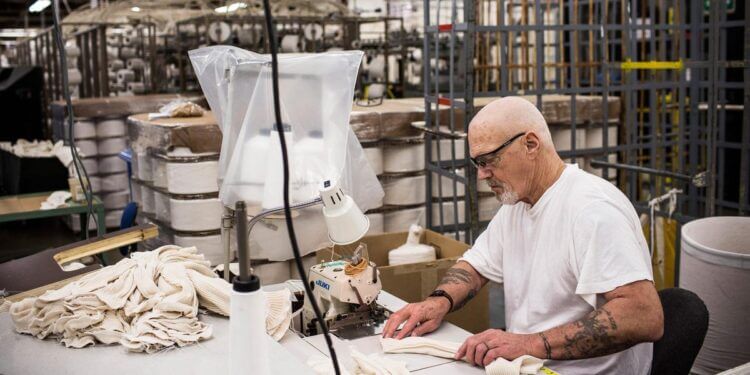The U.S. government often purchases office furniture and other goods made for pennies on the dollar by American prisoners. Believe it or not, it’s been happening for decades. And Gizmodo has obtained documents that provide a peek at what prison labor products U.S. Immigration and Customs Enforcement in particular has been buying.
Through the Freedom of Information Act, Gizmodo has received invoices to ICE, the federal immigration police force, from Unicor, the corporation run by the U.S. Bureau of Prisons and staffed almost entirely by inmates. (Unicor’s other name? Federal Prison Industries, Inc.) The invoices show what ICE has purchased from Unicorn since June 1, 2020.
What exactly did we find through a FOIA request of ICE and Unicor invoices? ICE purchased office furniture like conference tables, bookshelves, desks, and chairs. One “float table,” was purchased by ICE this year with an invoice date in March of $3,463, according to the invoices. It’s not clear how much the table costs to make.
An invoice dated March 16, 2022, includes a walnut desk for $1,550, a conference table for $940, two four-shelf bookcases for $785 and $610 respectively, a filing cabinet for $720, a credenza for $1,320, and a corner desk unit for $585.
Another invoice from March includes six mesh chairs for a total of $2,334 ($389 each) and another single chair for $529. Other invoices sent to the agency show that ICE’s “admission kits,” packs of hygiene essentials likely given to detained immigrants, are made with prison labor.
These lightsabers are powered by Neopixels, LED strips that run inside the blade shape that allows for adjustable colors, interactive sounds, and changing animation effects when dueling.
Unicorn makes everything from firearms targets and signs to surge protectors and circuit boards. The company’s programs are billed as great work experience for inmates, though the labor is legally required. These goods are often stamped with “made in the USA” labels, but their labels don’t give any indication they were made by prisoners. Businesses can even hire Unicorn and its prison laborers to operate as a call center, which the company explains is a low-cost option for local U.S.-based labor and phone operators who are proficient in English
“Imagine… All the benefits of domestic outsourcing at offshore prices. It’s the best-kept secret in outsourcing!” the Unicorn website proclaims.
To be clear, the use of prison labor is not new. Unicorn was founded in 1977 and has been churning out products for decades, all thanks to the U.S. having the largest prison population in the entire world. But even if you know it’s going on, there’s something still quite shocking about combing through the invoices for a system of forced labor.
People in the U.S. prison system produce over $2 billion in industrial goods and services each year, according to the ACLU. Yet prison workers average between $0.23 and $1.15 per hour, according to Unicor’s website, well below the federal minimum wage of $7.25. (The minimum wage hasn’t risen since 2009, of course, but that’s a discussion for another time.)
Another invoice indicates the federal agency paid $3,081 for freight costs on undisclosed items and $1,108 for freight on others, though it’s not clear if those are the shipping costs for all of ICE’s recent purchases.
ICE also ordered 10,000 “admission kit” packs of toothpaste and small toothbrushes from Unicor at $1.05 per unit, likely items were given to migrants detained by ICE.
The kits are displayed on the Unicorn website as “Personal Hygiene Kit #66.” The invoices also include admission kits containing maxi pads. More expensive kits appear to go for $3.40 per unit and include more things like combs, bars of soap, and razors
We say these kits were presumably given to ICE detainees because Gizmodo reached out to ICE for more information about the purchases, asking basic questions like what the toothbrushes they purchased are for. A spokesperson for ICE, Alexxis Abascal, told Gizmodo they would look into the questions but first wanted to know, “What story related to detention are you looking to tell?”
After our explanation that Gizmodo had received some documents through FOIA and hoped to better understand how ICE decides when to buy from prison labor, we received a response that we’d have to file a FOIA request for any answers to our basic questions. But perhaps it’s not surprising that ICE wouldn’t want to answer questions about its reliance on U.S. prison labor to make things for its own migrant prisoners.
Gizmodo has uploaded the complete list of invoices obtained through its FOIA request to the Internet Archive.





